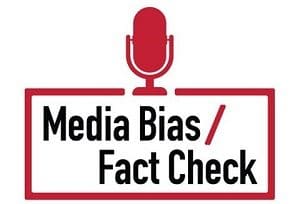QUESTIONABLE SOURCE
A questionable source exhibits one or more of the following: extreme bias, consistent promotion of propaganda/conspiracies, poor or no sourcing to credible information, a complete lack of transparency, and/or is fake news. Fake News is the deliberate attempt to publish hoaxes and/or disinformation for the purpose of profit or influence (Learn More). Sources listed in the Questionable Category may be untrustworthy and should be fact-checked per article. Please note sources on this list are not considered fake news unless specifically written in the reasoning section for that source. See all Questionable sources.
- Overall, we rate the Competitive Enterprise Institute Questionable based on far-right bias, promotion of propaganda, use of poor sources, lack of transparency with funding, and a general rejection of scientific consensus.
Detailed Report
Reasoning: Propaganda, Poor Sourcing, Lack of Transparency, Rejection of Scientific Consensus, False Claims
Bias Rating: FAR RIGHT-BIAS
Factual Reporting: LOW
Country: USA
MBFC’s Country Freedom Rating: MOSTLY FREE
Media Type: Organization/Foundation
Traffic/Popularity: Minimal Traffic
MBFC Credibility Rating: LOW CREDIBILITY
History
The Competitive Enterprise Institute (CEI) is a non-profit, libertarian think tank in the United States. Founded by Fred L. Smith, Jr., on March 9, 1984, in Washington, D.C., it seeks to advance economic liberty by fighting excessive government regulation. It believes that a free marketplace that allows entrepreneurship and innovation to thrive is a better policy. The current President and CEO is Kent Lassman.
Read our profile on the United States government and media.
Funded by / Ownership
The Competitive Enterprise Institute is a nonprofit that is funded through donations. Up until 2006, Exxon-Mobil donated 2 million dollars to the CEI. The CEI does not disclose donors; however, they are heavily financed by the Bradley Foundation, the Koch Family, and numerous gas/oil companies such as Amoco and Texaco.
Analysis / Bias
In review, the CEI promotes environmental policies based on limited government regulation and property rights and rejects what they call “global warming alarmism.” Headlines and articles typically contain emotionally loaded language that favors the right such as this Wrong Again: 50 Years of Failed Eco-pocalyptic Predictions. This story comes from the questionable climate change denial website RealClimateScience. When not promoting climate change pseudoscience, they advocate for Libertarian positions such as small government and property rights.
Editorially, the primary purpose of the CEI is to mislead on climate change. Scientists have criticized them for publishing misleading information such as Scientist to CEI: You Used My Research To “Confuse and Mislead.” According to Ballotpedia, the “CEI believes that scientific consensus on climate change and global warming were politically rather than scientifically motivated.” Finally, the CEI has a long history of lobbying for the tobacco industry and, since 2011, has advocated for the e-cigarette industry. In general, they are a right-biased advocacy group that sometimes promotes misinformation to advance its agenda.
Failed Fact Checks
Overall, we rate the Competitive Enterprise Institute Questionable based on far-right bias, promotion of propaganda, use of poor sources, lack of transparency with funding, and a general rejection of scientific consensus. (D. Van Zandt 7/12/2016) Updated (02/09/2024)
Source: https://cei.org/
Last Updated on February 9, 2024 by Media Bias Fact Check
Do you appreciate our work? Please consider one of the following ways to sustain us.
or
Left vs. Right Bias: How we rate the bias of media sources


